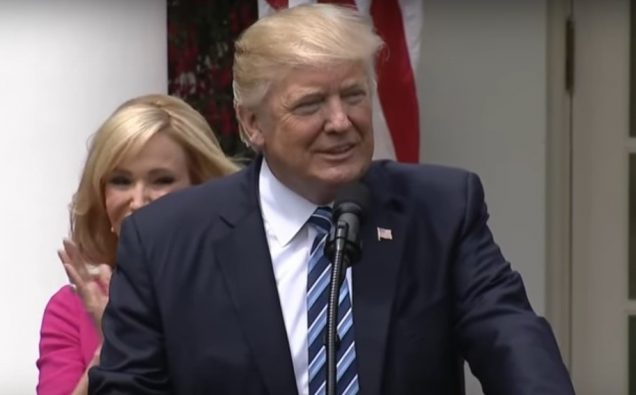
Photo : Screenshot/White House official YouTube video
President Donald Trump will visit Saudi Arabia, Israel and Rome – centers for followers of three monotheistic faiths – in a major move seeking to forge common cause in the fight against intolerance and terrorism.
The White House Thursday said the president’s discussions in the Middle East will also explore ways to bring “genuine peace” to Israelis and Palestinians and discuss the “need to counter the threats posed by Iran.”
His first foreign trip later this month will also include Trump’s participation in the G7 conference of world economic powers to be held in Sicily and a meeting of NATO leaders in Brussels.
However, it is the US president’s visits to centers of Abrahamic religions that hold much significance at a time when the world is grappling with a spate of challenges including rise of intolerance in several countries including major Western powers, and escalating tide of terrorism in the form of ISIS and other groups in the Middle Eastern countries.
“Tolerance is the cornerstone of peace,” Trump prepared to say at a ceremony on Thursday.
Significantly, Trump said his visit “will begin with a truly historic gathering in Saudi Arabia with leaders from all across the Muslim world.”
“We will begin to construct a new foundation of cooperation and support with our Muslim allies to combat extremism, terrorism and violence.”
He also indicated a narrowing down of the traditional U.S. foreign policy approach – partly practiced by his predecessor Barack Obama – on seeking to reform the ways of rulers of the countries Washington engages with.
Trump’s remarks suggested he aims at bringing Jews, Christians and Muslims together toward the goal of peace and stability in the region.
“Our task is not to dictate to others how to live but to build a coalition of friends and partners who share the goal of fighting terrorism and bringing safety, opportunity and stability to the Middle East.”
According to the White House Thursday said President Trump’s visit to Saudi Arabia will “reaffirm the strong partnership between the United States and Saudi Arabia and allow the leaders to discuss issues of strategic concern, including efforts to defeat terrorist groups and discredit radical ideologies.”
During his meetings with Israeli leaders, the White House said, Trump will further strengthen the United States-Israel partnership, and discuss countering Iranian threats as well as ways to advance a “genuine and lasting peace” between the Israelis and Palestinians.
“The leaders will discuss a range of regional issues, including the need to counter the threats posed by Iran and its proxies, and by ISIS and other terrorist groups.
Press Secretary Sean Spicer said in a statement that President Trump has also accepted the invitation of President Mahmoud Abbas of the Palestinian Authority to meet with him to “discuss ways to advance peace between the Israelis and Palestinians, as well as efforts to unlock the potential of the Palestinian economy.”
Trump hosted Abbas at the White House on Wednesday and expressed a strong determination and confidence on resolving the decades-old Middle Easter conflict.
Next to Italy, Trump will meet with Pope Francis at the Vatican to discuss cooperation between the United States and religious communities in areas of joint concern.
From Rome, where Trump will meet the Italian leaders, he will continue on to previously announced visits to Brussels for the NATO summit and meetings with EU and Belgian leaders, and to Sicily for the G-7 meeting, the statement said.
President Trump’s first visit to the Middle East is likely to draw invoke comparisons with his predecessor Barack Obama’s outreach with a 2009 speech in Cairo with the ambitious aim of bridging the divide between Islam and the West.
But since then a lot has changed in the Middle East with the Iraq and Syrian civil wars having weakened the two states and the ISIS posing a fierce terrorist threat to the Muslim and European countries. The U.S. has been fighting the ISIS in both countries as well as in Afghanistan.
The White House statement also represents a clear break with the previous Obama Administration on Iran, which has been seeking to return to the international stage after a nuclear deal through use of both proxies in the Iraq and Syrian wars and its economic and energy exporting potential.
Saudi Arabia and Israel had major differences with the Obama Administration, which negotiated a nuclear deal with Iran to halt Teheran’s atomic weapons program.














